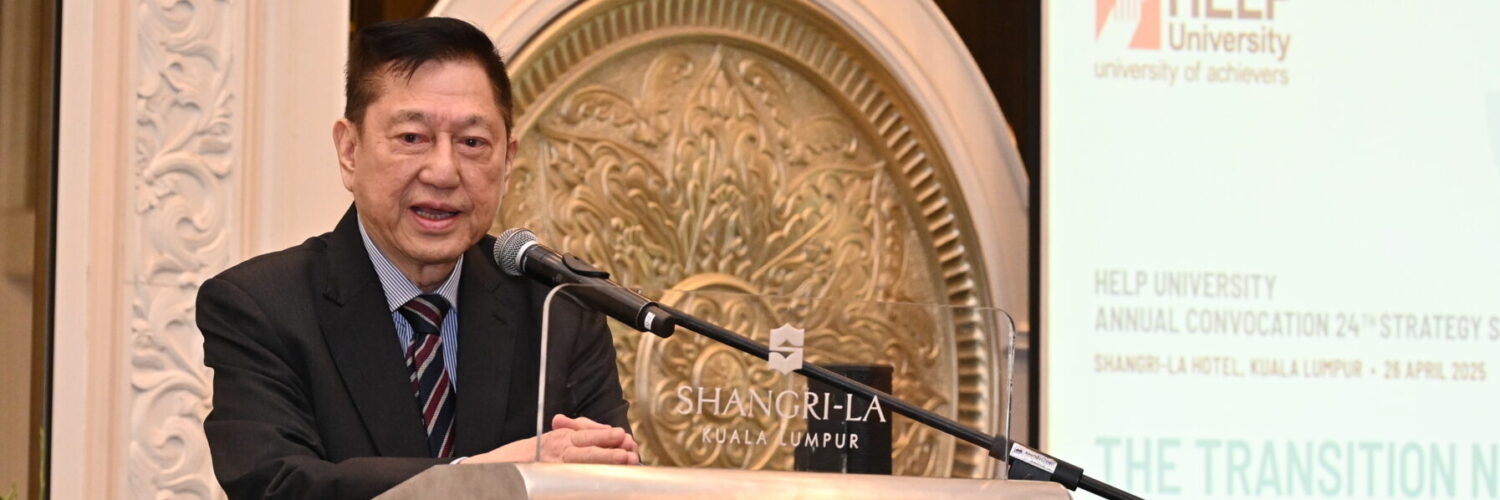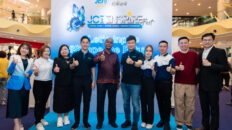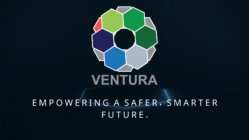by Aileen Anthony
E-X-A-D-A-P-T-I-V-E leadership
“In a world where the map is being redrawn every day by shifting global forces, leadership serve as the only reliable compass.”
Professor Datuk Dr Paul Chan, Chancellor of HELP University
“But it cannot be leadership as we have traditionally known it. It must be what I call E-X-A-D-A-P-T-I-V-E leadership that is prudent, exponential, and capable of rearranging existing resources to solve problems that have not even emerged.”
At the heart of Datuk Paul Chan’s address was a clarion call to rethink how we learn, lead, and navigate a future of unknowables. He passionately spoke about the need to transcend outdated educational and professional paradigms. “We cannot solve the problems of our country, and certainly not the world, unless we move beyond siloed thinking,” he emphasised. “This is no longer the age of mono-disciplines or interdisciplinary work. We have entered the era of transdisciplinary learning.”
The Transition Nexus
Framing the Symposium’s discussions was a concept Datuk Paul Chan termed the “Transition Nexus” — a convergence of experiential learning, Intelligent Adaptive Management (IAM), and the principles of the circular economy. In this nexus, learning is no longer a linear transfer of information but a dynamic process of identity formation through “learning by doing, then knowing, and ultimately, becoming.”
“Experiential learning,” he explained, “is a powerful foundation for life-long learning and, more importantly, life-wide learning. It is not just about acquiring information. It is about creating an identity — about transformation at the deepest level.”
Datuk Paul Chan also urged educators, policymakers, and industry leaders to embrace a shift from experiential to experimental learning. He said that recognising and building on prior and post learning creates a richer, more flexible educational ecosystem that mirrors the fluid, unpredictable nature of the modern world.
Artificial Intelligence (AI) as an Amplifier, Not a Prison
Acknowledging the profound disruptions caused by AI, Datuk Paul Chan was clear-eyed about the risks — but equally emphatic about the possibilities. “As we discuss the difficulties and negative aspects of AI, we must learn to master this tool such that it does not imprison us or condition us but liberates us,” he said.
He argued that AI can amplify human learning, enabling better visualisation, systematic thinking, and a deeper understanding of complex systems—including those underpinning the circular economy.
“Experiential learning assisted by AI,” Datuk Paul Chan noted, “helps us to understand systematic thinking — a vital step in solving problems that cut across sectors and disciplines.”
Leading Beyond the Shadow of the Future
Looking ahead, Datuk Paul Chan emphasised that leaders must abandon the illusion of a fixed roadmap. Instead, leadership must be a daily act of recalibration rooted in courage, prudence, and imagination. “The future is made up of unknowables,” he reminded the audience. “And because of this, the greatest leadership challenge is to adapt exponentially — to be exadaptive — to harness what we know to solve what we have yet to encounter.”
In this context, the ‘Transition Nexus’ offers a model for education and a mindset for survival and flourishing. “Businesspeople, academics, policymakers, and all with diverse experiences must work together to chart a way forward. Beyond the shadow of the future, we must experiment, experience, and lead—we are the mapmakers, and the journey itself is the education.”
In its 24th year
Now in its 24th year, the Strategy Symposium is held annually ahead of HELP University’s convocation to explore the defining issues of our time. This year, the Symposium brought together a host of presenters and panellists to explore how AI-driven experiential learning, circular economy principles, and cross-sector collaboration between government, universities, and industry can drive innovation in an era of uncertainty. It presented actionable insights on reframing transitional innovation models, offering a fresh lens for navigating a rapidly changing world.
The Symposium also witnessed the signing of three Memoranda of Understanding (MoUs), signalling HELP University’s commitment to expanding global partnerships in education, research, and professional development.
Building a Stronger Bridge
- The first MoU was signed with Hunan University of Technology in Hunan, China — the country’s top university for packaging technology and a leader in research related to high-speed rail, aviation, and advanced AI applications. “Hunan University of Technology is located in one of China’s most dynamic industrial cities,” said Datuk Paul Chan. “It is well-known for its breakthroughs in fast train technology, aviation, and AI, and this partnership will open up exciting pathways for joint research and innovation.”
- Global Education Advancement Group, a NASDAQ-listed company, formed the second partnership. “Global Education Advancement has an impressive 66 million customers using their online courses,” Datuk Paul Chan noted. “Our collaboration will focus on restructuring how we learn, particularly by integrating scalable online education models with our academic offerings.”
- The third MoU was signed with Australia’s Institute of Public Accountants (IPA). “IPA has developed a sophisticated learning system that matches learning with the actual skill requirements in the workplace,” Datuk Paul Chan explained. “It’s not about how much you learn, but whether the learning fits the competencies needed in the real world. With its hundreds of competency-based modules, IPA’s system will be critical in strengthening training for the financial and accounting industry.”
“These three partnerships,” Datuk Paul Chan emphasised, “will play a pivotal role in enabling the implementation of the ideas we have discussed today — from experiential and experimental learning to building a stronger bridge between education, industry, and the demands of the future economy.”








